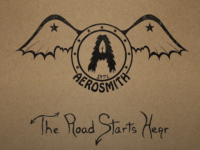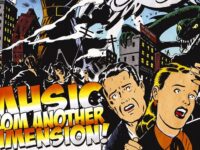Still smarting from the awful solo work out of Aerosmith frontman Steven Tyler’s camp? Have you found it as difficult as I have coming to grips with the fact that my favorite rock band is dying a slow, painful death?
The worst part, really, is that I had been so energized as a fan when Honkin’ on Bobo arrived on March 30, 2004. It seemed to offer hope about the future of this group.
The road for Aerosmith fans hasn’t been an easy one since the release of 1989’s Pump, which remains the band’s best post-1970s record. They followed it up with 1993’s lukewarm Get a Grip. Despite the video success of the “CryinAmazaCrazy” trilogy, the record was mediocre at best, and is among my least favorite outings by the band – second on that list only to 1982’s Rock in a Hard Place, which didn’t feature guitarist Joe Perry and had only a limited presence from guitarist Brad Whitford.
Aerosmith hit another high note with 1997’s underrated Nine Lives, but then found the top of the charts for the first and only time, unfortunately, with one of the worst songs they’ve ever recorded – the Diane Warren-penned “I Don’t Want to Miss a Thing.” They entered the new millennium with a Super Bowl performance that featured Britney Spears and ‘N Sync, the release of the strange, electronic (but sometimes entertaining) Just Push Play in 2001, and a string of compilation records that left some folks scratching their heads.
Finally, though, it seemed that the band was getting their collective heads back together and going back to the roots of their music with the release of the horribly titled, but quite good Honkin’ on Bobo. The collection was largely made up of rock versions of blues tunes, it was recorded in live sessions with all five members in the room at once, and it saw the return of producer Jack Douglas, who was responsible for some of the band’s best work – including 1976’s Rocks and 1975’s Toys in the Attic.
More than that, though, it saw the return of the classic Aerosmith sound. The arrangements, while still often over the top, were stripped down from the bombast of their last few records, and it really had the feel of old-school Aerosmith.
Though they put the focus on the single “Baby Please Don’t Go” – which has been recorded by everyone from John Lee Hooker and Muddy Waters to AC/DC and Ted Nugent – it was actually one of the weaker tracks on Honkin’ on Bobo. The true star of the album is the second song, a cover of Smiley Lewis’ “Shame, Shame, Shame.” Clocking in at barely over two minutes, it packs a lot of energy into a short running time. It blasts out of the gate with a memorable Chuck Berry-influenced guitar lick from Perry, as bassist Tom Hamilton and drummer Joey Kramer kick in with a driving rhythm.
The song roars, swings and flat out rocks. It sounds like Aerosmith. It sounds like 1970s Aerosmith. It sounds like a band with fire – a band in its prime, as opposed to Just Push Play’s aging rockers trying to remain relevant. I maintain that “Shame, Shame, Shame” is easily the best song Aerosmith has recorded since the ’70s.
But there’s more good stuff here. A grooving cover of Bo Diddley’s “Road Runner” gets the album off to a promising start. They slow things down to a barroom blues feel for Sonny Boy Williamson’s “Eyesight to the Blind,” which just goes to prove that Aerosmith could, at that time, still get it done without all the extras. It also makes good use of Tyler ’s harmonica skills.
One of the most interesting tracks on the record is “Never Loved a Girl,” a modified version of Aretha Franklin’s “I Never Loved a Man.” It’s another fairly low-key affair, with Perry wailing away with clean guitar licks and Steven Tyler wailing away with his voice, trying to match Franklin’s performance. He’s often in his falsetto on the chorus, and it’s one of his better vocal performances of the band’s later years.
Joe Perry also gets a few turns at the mic on this record, most notably the slinky “Back, Back Train,” which is my favorite Aerosmith track with the guitarist on vocals. Tracy Bonham also appears on the track, providing a more soulful counterpart to Perry’s largely restrained performance. He’s also featured on a version of “Can’t Stop Messin,’” originally recorded by Peter Green’s Fleetwood Mac.
There’s an energetic rendition of “You Gotta Move” that’s a far cry from the stark Delta blues version recorded by the Rolling Stones. There’s a dark, smoky version of Willie Dixon’s “I’m Ready.” And Honkin’ on Bobo closes with a surprisingly traditional take on “Jesus is on the Main Line,” featuring some tasty acoustic slide guitar by Perry and a choir approach to the backing vocals, using Bonham and all of the members of the band.
Perhaps tellingly, the weakest link on the record is the only true Aerosmith song, “The Grind,” which has just a little too much of the slick, commercial “CryinAmazaCrazy” sound. It’s an attempt at a bluesy rocker to show their connections to the other music on the album, but ends up in stark contrast to most of the those tracks – really reinforcing how much better the blues-based Aerosmith of the 1970s was than what they had become.
After Honkin’ on Bobo, I was pumped and excited to hear what would come next. It seemed Aerosmith had once again found themselves, and that vibe of their early work that made them my favorite band. I hoped the energy of these covers would translate into a bluesy, all-out rocker of an Aerosmith album, reminiscent of their best work. There was chatter from their camp that seemed to confirm that direction.
Instead, we’ve received a steady diet of compilations and live sets featuring music we already have. We’ve watched as the band nearly broke up a few years ago, and Perry openly talked about hiring a new singer to replace Tyler. We saw Tyler fall off the stage, off the wagon, and seemingly, off his rocker, as he talked about working on “brand Tyler” and judged the world’s biggest karaoke contest. Their next album was a big disappointment.
And the organic spirit and energy of Honkin’ on Bobo? Well, it’s apparently long gone.
- How Black Sabbath’s Self-Titled Debut Invented a New Genre of Music - February 5, 2025
- Alestorm, Ratt, Zeal & Ardor + Others: Fred Phillips’ Best of 2024 Metal and Hard Rock Songs - January 26, 2025
- Cody Jinks, Blackberry Smoke + Others: Fred Phillips’ Best of 2024 Country and Southern Rock - January 20, 2025



